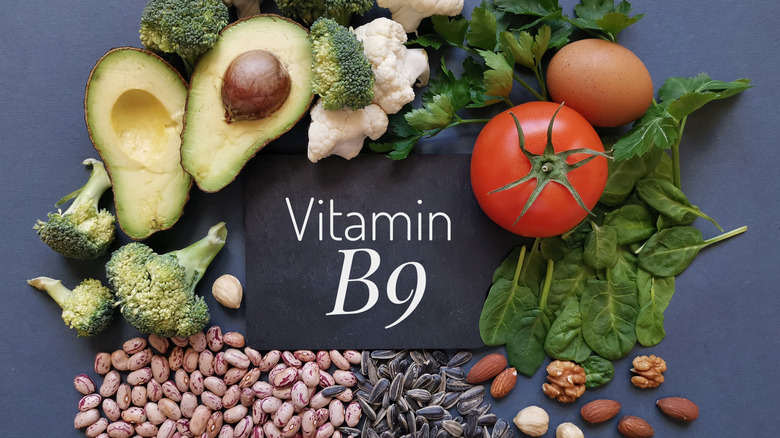The Woman's Supplement That Men Don't Realize They Need Too
When it comes to pregnancy, many people are familiar with folate and folic acid. Folate and folic acid are often used interchangeably, but they are not the same. Folate is found naturally occurring in whole foods and covers a range of B9 vitamins, while folic acid is just one type of folate that is synthetically made, per the CDC. The CDC also recommends that women of reproductive age take this essential B vitamin to avoid potential birth defects in the spine and brain of the developing fetus. Folic acid aids in the formation of the neural tube, which takes place early on in the pregnancy — at around three to four weeks of gestational age.
You may be surprised to learn that despite its important role in the healthy development of new human life, folate serves many purposes in the body that aren't specific to gender. MindBodyGreen points out that folate benefits both men and women by aiding in our gut's immune response. It plays a key role in the immune action of gut-associated lymphoid tissue (GALT) by helping white blood cells, known as T cells, survive and do their job.
Folate also supports proper brain functioning and mental wellness through its role in the formation of neurotransmitters, among them dopamine, serotonin, and melatonin (via MindBodyGreen). In fact, a 2016 study in the Journal of Clinical and Diagnostic Research found that low levels of B vitamins are associated with the development of Alzheimer's disease and cognitive decline.
How to ensure you're getting enough folate
The recommended dietary allowance of folate for both men and women is 400 micrograms, according to the Harvard T.H. Chan School of Public Health. This amount changes for both pregnant women and anyone who consumes large quantities of alcohol on a regular basis, which impairs the ability of folate to do its important work in the body. In both cases, the daily dose should be 600 micrograms of folate. That being said, it is best not to exceed the upper limit of 1,000 micrograms per day for any group.
There are many ways to ensure you're getting enough folate on a daily basis. This essential vitamin can be found in a wide array of food sources, including dark leafy grains, liver, and beans, per SFGate. A cup of romaine lettuce contains 64 micrograms of folate, while a cup of spinach provides 58 micrograms. One chicken liver delivers 254 micrograms of the vitamin, and a beef liver totals 172 micrograms. When it comes to beans, a cup of chickpeas contains 282 micrograms of folate, while kidney beans provide 230 micrograms. Certain foods are also enriched with folic acid, including breakfast cereals, rice, and white bread.
Another common and easier way to hit your daily folate needs is to supplement, according to the National Institutes of Health. You can find both folate and folic acid on the ingredients list in multivitamins and prenatal vitamins, as well as sold on their own.


